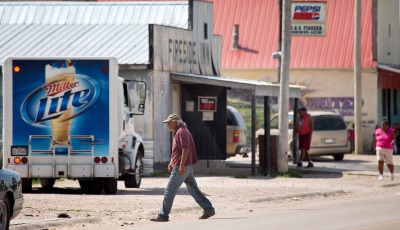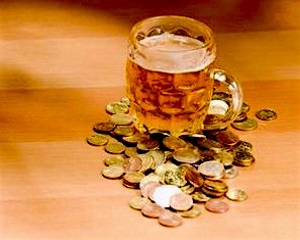Blog
Spotlight Shines on Whiteclay Disaster - 1/26/17
- Details
- Created: Thursday, January 26 2017 17:32
Sheridan County Commission Fails Residents
 On January 11, the Sheridan County, NE Board wasted an opportunity to address an unmitigated public health disaster in its back yard. Asked to evaluate the appropriateness of liquor store licenses in Whiteclay, NE—a tiny town of 12 that sells over 3.5 million cans of beer a year, largely to the neighboring, legally dry, Pine Ridge Reservation—the board voted unanimously to recommend reapproval.
On January 11, the Sheridan County, NE Board wasted an opportunity to address an unmitigated public health disaster in its back yard. Asked to evaluate the appropriateness of liquor store licenses in Whiteclay, NE—a tiny town of 12 that sells over 3.5 million cans of beer a year, largely to the neighboring, legally dry, Pine Ridge Reservation—the board voted unanimously to recommend reapproval.
Nebraska state government, spearheaded by State Senator Patty Pansing Brooks, has been aggressively pushing for open hearings around the Whiteclay liquor licenses. Key to this process was a recent hearing at which the liquor store owners made the case why their licenses should be renewed. Around 60 attendees made cases for and against reapproval, with the Omaha Journal-Herald reporting that the majority of arguments were against.
The Lincoln Journal-Star provided a rundown of the local ills caused by the flow of alcohol into Pine Ridge. These include unsolved murders, widespread fetal alcohol syndrome disorders, the overloading of local behavioral health and medical services, and lasting damage to the family infrastructure. “It’s in every single one of our families,” Pine Ridge advocate and Alcohol Justice ally Olowan Martinez told the Journal-Star. “No matter how educated, no matter how nice our homes and how good we live. We could be some of the haves, of have-nots, and still be affected by it.”
The Pine Ridge reservation abuts Sheridan County and bears much of the burden of Whiteclay-related alcohol harm, but the price tag is high for the county, too. The Associated Press estimated 1/3 of Sheridan County’s $5.2 million budget goes to costs incurred by alcohol use in Whiteclay. With no local police force, the town is also entirely reliant on the Sheriff’s Department, which has five officers to patrol an area the size of Delaware. This, critics say, makes the region un-policeable, further warranting a revocation of liquor licenses.
Proponents of the liquor stores argued that the responsibility for stopping alcohol harm lies with Pine Ridge and the residents who drink. They also maintained that the police presence, though paltry, was normal for a rural area. The Sheridan County Board concurred, and recommended the licenses be renewed.
The decision was slammed by the editorial staff of the Journal-Star, who called it “reprehensible” and asserted that it “ignored indisputable evidence that adequate law enforcement is absent in Whiteclay.”
The case will come before the Nebraska Liquor Control Commission on March 7, 2017. The three commissioners—Robert Batt, Janice Wiebusch, and Bruce Bailey—will make the final determination as to whether to honor the needs of the residents of Pine Ridge and Sheridan County, or to maintain the cycle of intoxication, exploitation, illness, and waste.
TAKE ACTION: stand with the people of Pine Ridge to shut down the Whiteclay liquor stores.
Budweiser Sheds Olympic Rings, But Still Stains the NFL
- Details
- Created: Thursday, January 26 2017 17:04
 Just months after renaming itself "America" in honor of U.S. Olympians, Budweiser has terminated its sponsorship of Team USA, CNN reports. The decision comes in the wake of disappointing ratings for the scandal- and Zika-plagued 2016 games in Rio de Janeiro.
Just months after renaming itself "America" in honor of U.S. Olympians, Budweiser has terminated its sponsorship of Team USA, CNN reports. The decision comes in the wake of disappointing ratings for the scandal- and Zika-plagued 2016 games in Rio de Janeiro.
According to Ad Age, Budweiser parent company A-B InBev found that the winter games were not a "key consumption period" for their product. The summer games, on the other hand, tended to attract an older, more female audience, while the brand hopes to reach young males.
Alcohol Justice Executive Director/CEO Bruce Lee Livingston applauded Budweiser's withdrawal, and urged them to go further. "A-B InBev spends hundreds of millions annually advertising during sporting events," he said in a press release. "This leads to increased underage drinking and turns family events into drunken, violent experiences."
A-B InBev has a $1.4 billion contract through 2022 with the National Football League, and is regularly the top spender in Super Bowl advertising. This lucrative relationship persists in the face of an alarming and persistent rise in violence at football games.
With that in mind, Alcohol Justice calls for A-B InBev to really live up to the name America, and take an action that would benefit countless young fans: keep withdrawing from sports sponsorships, starting with the Super Bowl. Livingston, however, is not optimistic. "They want young American men hooked on their beers, so unfortunately we expect them to keep going for the teen boy audience that the Super Bowl attracts," he said.
WATCH award-winning youth-produced counter-beer ads from past Free the Bowl® and Free Our Sports® video contests.

READ MORE about Zombie Spuds--A-B InBev resurrects youth-oriented icon for Superbowl ad, could reach 30 million kids.
READ MORE about getting alcohol out of our sports.
Raise the Beer Tax: A Healthy Plan for an Ailing Budget
- Details
- Created: Thursday, January 26 2017 16:54
 Sometimes there are easy answers to hard problems. California faces a $1.6 billion budget shortfall, in large part due to miscounted healthcare costs. According to Alcohol Justice, a $0.25 per beer tax would cover that and more. Nothing could be simpler. As Alcohol Justice Executive Director/CEO Bruce Lee Livingston said, “A beer tax increase is common sense, fiscally responsible, and long overdue.”
Sometimes there are easy answers to hard problems. California faces a $1.6 billion budget shortfall, in large part due to miscounted healthcare costs. According to Alcohol Justice, a $0.25 per beer tax would cover that and more. Nothing could be simpler. As Alcohol Justice Executive Director/CEO Bruce Lee Livingston said, “A beer tax increase is common sense, fiscally responsible, and long overdue.”
California’s beer tax hasn’t been raised in a quarter of a century, and is in the bottom half nationally. (Its liquor and wine taxes rank even lower.) The state is hardly alone in this; very few states have raised that rate in the past decade, and only Louisiana has done so within the past year. Proposed hikes in New Mexico and Kansas face industry opposition, despite the steady depreciation of current taxes as compared to inflation.
Alcohol product excise taxes play two roles. First, they generally raise revenue. Alcohol Justice maintains a tax calculator that estimates the total financial benefit to states for raising their excise taxes. A simple $0.25 tax per drink of beer would bring in over $1.7 billion dollars to California’s general fund.
Second, excise taxes can direct funds straight to programs that address the harms of alcohol. This model, called Charge for Harm, essentially places the responsibility on alcohol sellers for offsetting the damage their products cause. The end result, though, is still a savings to the state government; California picks up the tab for an estimated $13.7 billion in alcohol-related costs annually, including outlays for healthcare and criminal justice.
California is overdue to increase its alcohol taxes. Governor Brown may have missed his chance this year, but the need will grow. “Each year alcohol taxes are not raised translates into a government subsidy of Big Alcohol,” said Michael Scippa, Alcohol Justice’s public affairs director. “It's time for our state leaders to add a beer tax increase to any budget-balancing plan.”
READ MORE about Charge for Harm.
More Articles ...
Subcategories
Help us hold Big Alcohol accountable for the harm its products cause.
| GET ACTION ALERTS AND eNEWS |
STAY CONNECTED    |
CONTACT US 24 Belvedere St. San Rafael, CA 94901 415-456-5692 |
SUPPORT US Terms of Service & Privacy Policy |


